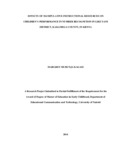Effects of manipulative instructional resources on children’s performance in number recognition in Likuyanidistrict, Kakamega county, in Kenya
| dc.contributor.author | Kagasi, Margret M | |
| dc.date.accessioned | 2014-12-08T06:30:57Z | |
| dc.date.available | 2014-12-08T06:30:57Z | |
| dc.date.issued | 2014 | |
| dc.identifier.uri | http://hdl.handle.net/11295/76464 | |
| dc.description.abstract | The study set out to establish whether manipulative learning resources influenced children performance during their learning of number recognition. A quasi experimental research design was used. Data was collected through questionnaires for te achers a n observation schedule in the class and pretest and posttest for the children in the participating schools. Data was presented in tables, line graphs and bar graphs. Data analysis was done by the use ANCOVA at alpha of 0.05.The results indicated t hat use of learning manipulative instructional resources helped the learners perform well in the learning of number recognition. And that teacher‟s attitude towards use of manipulative instructional resources affected their frequency of use during the less ons. The study recommends concerned parties should ensure that preschool classes are equipped with relevant manipulative instructional resources. There is need for the Quality and Standards Assurance officers visit preschool teachers more frequently and pr ovide their guidance on the importance of using manip ulative instructional resources in teaching mathematics | en_US |
| dc.language.iso | en | en_US |
| dc.publisher | University of Nairobi | en_US |
| dc.title | Effects of manipulative instructional resources on children’s performance in number recognition in Likuyanidistrict, Kakamega county, in Kenya | en_US |
| dc.type | Thesis | en_US |
| dc.type.material | en_US | en_US |
Files in this item
This item appears in the following Collection(s)
-
Faculty of Education (FEd) [5979]

